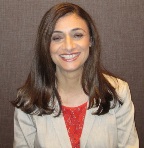7/22/14
We often take our vision for granted – and if you lose it, your life is turned upside down. I met Kooshay Malek at a Pacific Palisades Lions Club meeting and was amazed by her story. She has agreed to share with you how she “gave up seeing.” This three-part series will explore losing her vision, how it affected her career choice and how she expresses her creative nature.

My eyes are what brought me to the US. I was 16 when my father and I came here from Tehran, Iran, for eye treatment. My case was an unusual case: We still, to this day, don’t have a name for it, but it’s retinal tumors of some sort. My case had been through Europe, Russia, Israel, to different conferences, and they sent me to the US as a final recourse. During that time, in 1982, it was the Iran-Iraq war, and the airports were not open. My dad and I had to get special permits to get out for medical reasons. Then to get American visas, we were stuck in Frankfurt for a couple of months waiting. It was a very challenging time. Long story short, we got to Boston, and I started receiving treatments on my left eye. It didn’t respond well, and I became totally blind on the left side. Meanwhile, I could still see 20/20 on my right side. We moved to LA, where we had friends for support, and my mother and sister joined us. I was 18 when my right eye started going bad, and I started going to UCLA/Jules Stein for treatment. I went blind in that eye when I was 22.
My father passed away two years after I lost my sight. I finished college and went through independence training at Foundation for the Junior Blind in LA. I eventually decided to go back to school to get a master’s degree in psychology, because I realized I’m a good listener and I’m always wanting to help people, so I thought it would be a good way to channel that. And as a blind person, I didn’t think I had too many career choices.
I’ve been licensed as a marriage and family therapist for the past five years. I have a part-time practice, I do volunteer work at the clinic where I did my internship, and I help train up-and-coming therapists. I think one of the reasons I was so drawn to this field is the fact that when I became totally blind while I was in college, I was able to receive free counseling through school. But once I got out, I was looking for support groups and the camaraderie I had found during independence training — being around other blind people and helping each other emotionally. I couldn’t find anything like that. The only support groups I found were for seniors, so I just found a low-fee therapist to get some support. I’d lost my dad, lost my eyes, lost my country. I was dealing with so many losses. I think that’s why I’m so passionate about doing volunteer work in this area. I tried to pull together a support group for some blind clients, but it didn’t work out, partially due to transportation and location and the same stuff blind people always run into, but I do offer low- or no-fee counseling to them. I also have good relationships with some rehab counselors who refer people to me. I think therapy is an important part of rehabilitation; you have to approach this holistically.
I’ve always been very proactive and resourceful. I’ve often thought, “If only there were a 12-step program for blind people.” I’ve always been able to relate to people in these types of programs: They have to give up a habit that’s no longer working for them, and they have to put their lives back together, step by step, day by day, one day at a time. I really related to that: I had to give up the habit of seeing.
 Kooshay Malek
Kooshay Malek
Marriage and Family Therapist
Los Angeles, CA

